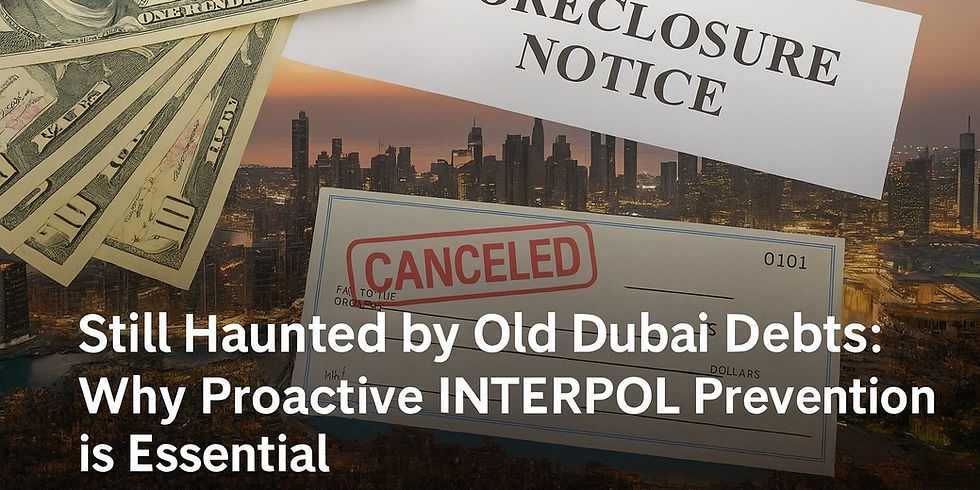Still Haunted by Old Dubai Debts - Why Proactive INTERPOL Prevention is Essential
- InterpolRedNotice.Com

- Aug 19, 2025
- 3 min read

In the late 2000s, Dubai was booming with property investment. Thousands of foreign buyers were encouraged to invest in off plan developments with promises of rapid returns. Mortgages were readily offered, often secured not by assets, but by blank post dated cheques handed over as part of the financing process.
When the 2008 global financial crisis hit, the market collapsed. Developers such as Nakheel revised terms or left buyers unable to recover deposits. Many investors were left with no property, no recourse, and huge debts they could not possibly service. Mortgage financiers, including government linked banks, resorted to presenting the security cheques when payments stopped. Under UAE law, a bounced cheque was and still technically is a criminal offence, even when arising from a civil or contractual dispute.
One investor, unable to keep up with payments during the financial crisis, saw his 400,000 AED deposit disappear when the bank moved to cash his security cheques. What began as a default quickly escalated into litigation and the threat of criminal prosecution. More than a decade later, he was still facing a criminal complaint for AED 1.75 million. Although recent reforms were promoted as removing criminal liability for bounced cheques, in practice these changes do not apply retrospectively. Old cases remain active, allowing prosecutors and creditors to pursue debtors through the criminal system, with the added danger of INTERPOL notices long after the original dispute. “We have submitted his case to the Commission for the Control of INTERPOL’s Files to ensure that any abusive attempt to circulate a Red Notice is blocked,” said Interpol and extradition expert, Radha Stirling.
This is not an isolated situation. Countless foreign nationals who defaulted on mortgages during the crash still face active or threatened legal actions in the UAE. Some have been surprised to find INTERPOL Red Notices issued years later, impacting their ability to travel, work internationally, or even open a bank account.
Why Prevention Matters
Interpol expert Radha Stirling, the founder of IPEX Reform and Detained in Dubai, has long warned of the dangers of INTERPOL abuse. Creditors in the UAE frequently weaponise the system to exert pressure, knowing that even the threat of a Red Notice can ruin someone’s livelihood.
To counter this, her team works with at-risk individuals to file preventive requests with the Commission for the Control of INTERPOL’s Files. This proactive step means that if the UAE or another jurisdiction attempts to issue a Red Notice, INTERPOL has already been alerted to the abusive nature of the case and is far more likely to block or delete it swiftly.
Advice for Those at Risk
Do not assume the passage of time will protect you. Even debts and bounced cheque cases from the financial crisis era remain active.
Law reforms in the UAE do not always mean practical relief. Despite announcements, old debts are still pursued, and creditors are still using criminal channels.
Be proactive, not reactive. Waiting until you are detained at a border crossing or denied a visa is too late. Seek expert advice. INTERPOL is a powerful tool, but it is also vulnerable to misuse. Having professional guidance can prevent devastating consequences.
Taking Control of Your Future
The reality is stark. People who defaulted on mortgages during the global crash are still facing legal and reputational risks today. The best protection is prevention. Preventive action gives at risk individuals the ability to travel, work, and live without fear of unexpected arrests or humiliating detentions.
If you are unsure whether you may be at risk, or you know of debts, bounced cheques, or unresolved disputes in the UAE, now is the time to act. Being proactive could mean the difference between freedom and years of legal battles.
Confidential advice? info@detainedindubai.org
Contact Detained in Dubai for expert advice, Interpol Red Notice prevention, debt negotiation or emergency assistance if still in the UAE
CEO and founder of Detained in Dubai,



Comments